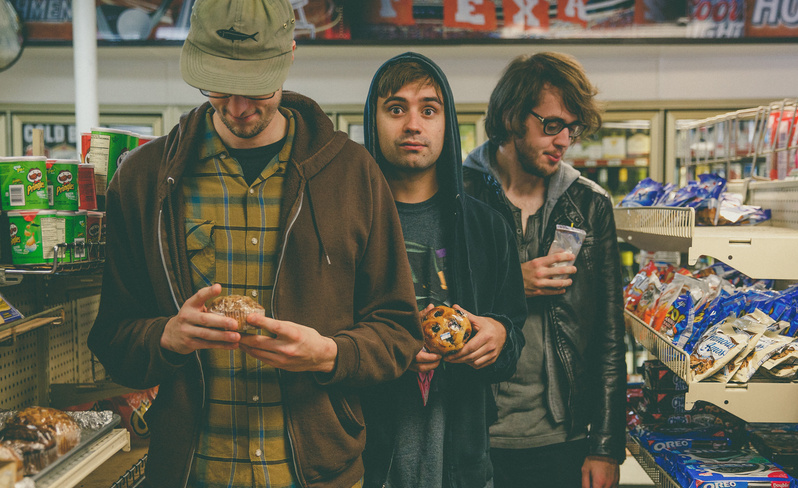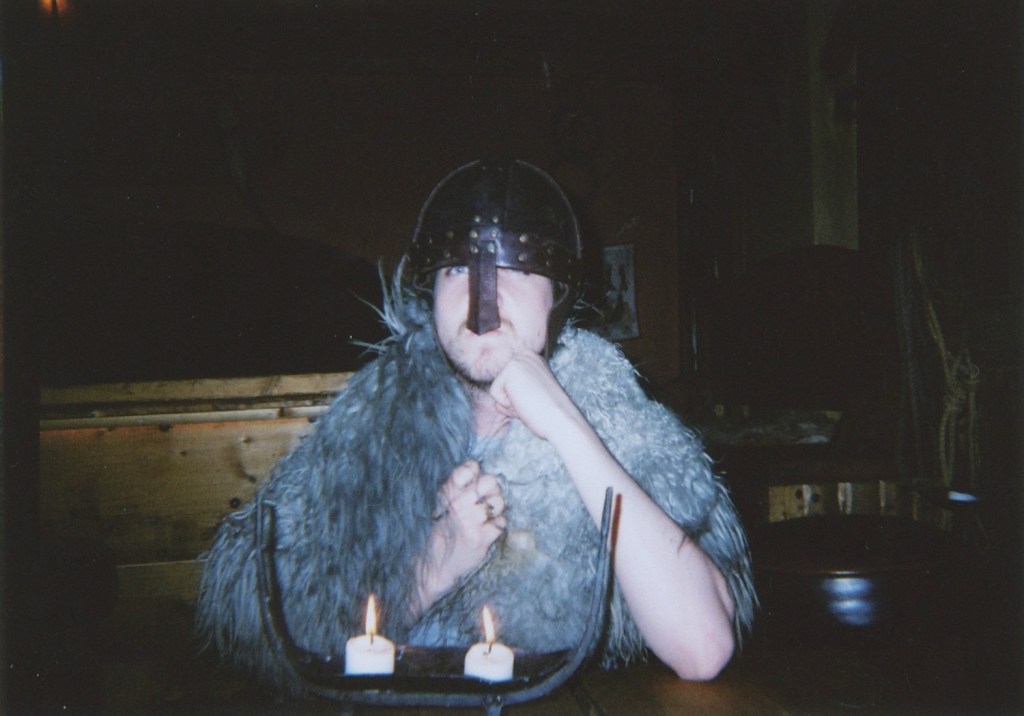Credit: Pooneh Ghana
The opening track from the new Cloud Nothings record is called “Now Here In,” and the first time I heard it, the only appropriate action I could think of doing was to throw myself against a brick wall.
Videos by VICE
This is a feeling that doesn’t stop throughout the band’s new LP Here and Nowhere Else. The ripping eight tracks move swiftly from burner to burner, with highlights including “Quieter Today,” “Just See Fear,” and “I’m Not Part of Me.” The album, like all glorious guitar rock these days, seems to embrace celebration—even if the music is about being pissed off about your past. If you’re in your mid-20s like me, listening to this Here and Nowhere Else feels a bit like Taking Back Sunday circa Louder Now, that point in your adolescent life after you’d gone through some shit (probably having to do with your precious little heart), you’d just gotten your license, and all you want to do is drive down the highway and listen to “MakeDamnSure” turned up to 17, shouting along every god damn lyric so loud that your stupid ex and her stupid face can just go be stupid together.
But outside of nostalgia for a band that probably makes some of our readership and editors cringe (hey Dan Ozzi, sup?), Here and Nowhere Else is a feat of rock music now. In a time where we can’t get enough of Skrillex’s wub-wubs because we’ve taken too much molly, it’s refreshing to hear a band channel some ’90s grunge and play super fucking loud and super fucking awesome. For this record, the Cleveland trio called up producer John Congleton (the Walkmen, Modest Mouse) and pushed what they learned from Steve Albini (who produced their previous record, Attack on Memory) into a sound inside a realm that feels somehow just as big, but stronger, more capable, and more mature.
A few weeks ago, while in New York to play their new record in full at the new Rough Trade record shop in Williamsburg, band members Dylan Baldi (vocals) and Jayson Gerycz (drums) stopped by the VICE office and had a chat with me about their new record, guitar music, and DIY.
(Unrelated: Dylan and I have the same watch, and we both get frustrated with the ticking that keeps us up at night.)
How do you feel about the new record?
Jayson Gerycz: I like it.
Dylan Baldi: I’m into it.
The previous record was received so positively. What was it like going into the new record with that behind you?
Dylan: I don’t think it really changed anything. It’s making a record, you know? We just made songs. We tried not to listen to what anybody said. We took the same approach.
Jayson: We had a different studio and a different guy we worked with, but it felt the same. We wrote the songs, you know?
How did you apply what you learned from Steve Albini producing Attack on Memory?
Dylan: I mean, it didn’t fundamentally change our lives. But going into this record, this was the first time we’d ever recorded in a studio studio. So we learned what that was like, because it’s a pretty different experience.
How did that affect the music?
Dylan: It just feels more professional. [Laughs.]
Jayson: When we’re not in the studio, it’s just us putting mics in front of things. It’s a lot different. It’s engineered by us versus, you know, someone who knows what they’re doing. It’s also a lot easier for us, because we don’t really know what we’re doing. [Laughs.]
With Here and Nowhere Now, what are you most proud of?
Dylan: I think the songs are better. Interesting is a stupid word, but they’re more interesting. There’s more going on than you probably notice the first time. It’s a grower, and I’ve always wanted to make a grower.
What makes an album a grower?
Dylan: Just if it’s not as immediate, not a straight ahead pop song or if there’s levels to it. Makes it fun to listen to. Like it’s this insidious vine or something.
The tonal shift with Attack on Memory was so obvious immediately—that opening track was so different than your previous work up until that point. This record doesn’t shift so dramatically.
Dylan: It’s just getting easier to play together, really. Everything sounds more natural the more we play together, the more we release records.
You guys are still quite young, but when Cloud Nothings started, you were like 18 years old. How are you approaching your music now versus when you started out?
Dylan: I’ve always viewed it as a fun thing to do until it’s done. [Laughs.] That hasn’t changed. If you change the way you do it, it starts to get weird. Things get to where they’re not where they’re not real anymore. If you’re stuck and it’s not working anymore, you just do something else.
What signifies you don’t do it anymore?
Dylan: If people don’t like you and no one comes to your shows, you should probably consider something else. [Laughs.]
Did you feel any pressure going into this record?
Jayson: A little bit. The songs are a little harder, so that brought some pressure.
Dylan: There’s a pressure to perform better, too. But I don’t know. It’s hard to think about stuff like that because it doesn’t feel like something we should worry about, really. We’re just trying to make a good record that we like, and in that process, you shouldn’t really abide to the pressure you feel from someone else. Just try not, you know?
That’s probably the best way to handle it. Just don’t think about it.
Dylan: Right, exactly. It’s way better. If you think about it, you think about it, and that’s all you think about, and it starts getting crazy.
How do you feel like this record has grown lyrically?
Dylan: Well, I’ll preface this by saying that I don’t really care about the lyrics, for the most part, within the context of our music. But on this one, it deals with all the same themes, I guess. All the songs are about the past and being pissed off.
It’s funny because you seem so nice.
Dylan: Oh, I’m a dick. [Laughs.] But I will say that the older songs tend to take a negative view of a situation, and the newer ones want to look at things almost positively, but with the same negative framework. It’s just trying to think about things in a different light, you know?
Why don’t lyrics matter?
Dylan: I mean, do they matter to you?
Yes.
Dylan: So, why?
I mean, on a basic level, lyrics are another tool to express something in music or art.
Dylan: I guess for me, I’m trying to create a general theme with the music, but I guess the actual words aren’t as important, as long as it expresses something within that, vaguely. We write the music and then I write the lyrics the day before we have to record them. [Laughs.] That’s how it works usually. The way we usually make our music is last minute. And because we make all the songs last minute, it sounds more exciting. I like the sound of people figuring it out on records, you know? Versus something that’s really accomplished and perfect.
Since 285 Kent closed in Brooklyn, there’s been a lot of discussion about what DIY culture is and what it means in the current culture climate.
Dylan: Well, all of Cleveland is DIY. Like, if you were to talk to concert promoters about DIY culture in Cleveland they wouldn’t really know—well, that’s just like not a conversation we have.
Jayson: You have to just set up a show if you want to play a show.
Dylan: So growing up there and being from there, it can make being concerned with stuff like seem a little embarrassing.
In what way?
Dylan: Well, you know, it’s embarrassing to be associated with certain things, but you have to do it sometimes. And sometimes they can pay you some money and all you have to do is put Converse on a thing, and it’s not a huge deal. I don’t really feel strongly one way or another.
There’s been a shift in indie rock over the past five years, and there’s not a lot of exciting guitar music right now.
Dylan: That’s true. There’s not a lot of good guitar bands right now. That’s a true statement. [Laughs]
Then what’s it like to work in that genre?
Dylan: Yeah. I mean, most of the more popular stuff isn’t guitar driven, so it’s the times, I guess. It’s the future. But I don’t know.
Jayson: I mean, I love hip-hop. I love electronic music. It doesn’t really bother me.
Why do you think this is happening?
Dylan: I don’t know. It’s a bit of a lull, but I guess maybe it’s easier to make music on your MacBook?
Jayson: People also haven’t been doing this type of music as long, so it’s not everywhere.
Dylan: I mean, most of the stuff going on outside of indie rock is genuinely more exciting. And I don’t know why, really. It’s just how it’s going right now. I’m sure in a little bit there will be some crazy punk band or some insane guitar band that saves us, you know? [Laughs] But right now, a lot of it just kind of boring now.
Your music isn’t boring though.
Dylan: I just try to make songs that I like. If they’re boring, that’s too bad, you know? And if people think they’re boring, then I guess I’m sad.
How much do you care about fan reception?
Dylan: It’s great that people like us. You have to care about that. But I think generally we just try to make music that we like. If we aren’t excited about it, it’s just not cool or fun. But if we can make something we’re very excited about and people also happen to like, that’s ideal.
Jayson: That’s the sweet spot.
The record is eight songs.
Dylan: Eight is a good place to stop. Once you have eight songs in the same style, the ninth song just sounds the same. You gotta stop at eight. I do, at least.
Eric Sundermann’s debut record will be the best record ever and have nine songs on it simply in the name of trolling Cloud Nothings. He’s on Twitter — @ericsundy
Follow YNTHT on Twitter — @YNTHT_Nordics




